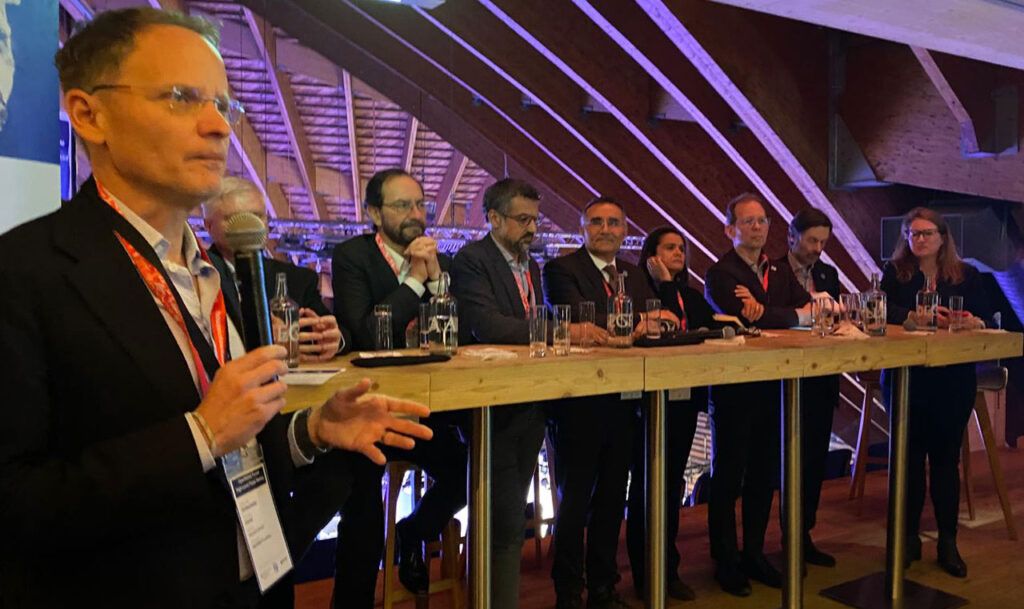
Open standards needed to build trust in digital wallets
Digital wallets are unbeatable for convenience – easing payments, helping verify your identity, and keeping your funds accessible as you move around.
Until you cross an international border. That’s when regulatory differences, currency conversion issues, and technical glitches can all suddenly get in the way.
At that point, plastic cards or old-fashioned cash may still rule.
Making digital wallets work abroad depends on setting open standards for interoperability, according to the global, public-private OpenWallet Forum begun last year.
“From making payments easier to proving identity, digital wallets can make meaningful differences in people’s lives,” said Secretary-General Doreen Bogdan-Martin, Secretary-General of the International Telecommunication Union (ITU). “But to do so, they need to be interoperable, secure, and useful anywhere we take them.”

In Davos, Switzerland at the OpenWallet Forum High-Level Panel Organized by the Swiss Federal Office of Justice with the International Telecommunication Union on 22 January. Beat Jans, Swiss Federal Councillor, Doreen Bogdan-Martin, ITU Secretary-General, and H.E Solly Malatsi, Minister of Communications and Digital Technologies, South Africa
A call for collaboration
ITU and other organizations issued a call to action on 22 January to develop and promote interoperable wallet solutions and advance digital transformation worldwide.
The announcement came during a high-level panel session on digital trust and global interoperability during the annual meeting of the World Economic Forum in Davos, Switzerland,
The Swiss Confederation co-hosted the event with ITU and the OpenWallet Foundation (a Linux Foundation project), building on the collaborative, multistakeholder standardization initiative launched at ITU’s WSIS+20 Forum High-Level Event in May 2024.
“A better digital future begins not with technology, but the shared will to build it together,” said Beat Jans, Swiss Federal Councillor. “The cartographers of tomorrow don’t sketch landscapes; they design the architecture of trust.”
Interoperable digital wallets and credentials would let people from any country participate securely in the global digital economy. But varying financial regulations and standards can make seamless cross-border operations difficult.
The panel underlined the need for partnerships among governments, standards bodies, and technology developers to make global interoperability happen.
Identity is everything
Digitalizing people’s identity documents is key.
Digital wallets can store various credentials for easy identity verification, with robust security features to protect personal information. International standardization should expand financial inclusion and give users better control over their personal data.
Rather than just “improving systems,” the meeting was about “redrawing the contours of identity and information in the digital age,” Jens said.
But while digital transformation opens new opportunities globally, it also presents challenges in terms of security, privacy and user-friendly data exchange.
South Africa’s Minister of Communications and Digital Technologies, Solly Malatsi, and Sergio Mujica, Secretary-General of the International Organization for Standardization (ISO), added further insights on how to make digital ID and wallets work smoothly all over the world.
Key recommendations
The concluding call to action highlights critical issues such as security, privacy, consumer choice, and inclusion.
Here are the key recommendations:
- Explore ways and means for greater collaboration and coordination between governments, international organizations, standardization bodies, mobile device manufacturers, software developers, academia and other relevant non-governmental actors involved in the development of digital wallets to ensure maximum benefits to the global community.
- Exchange best practices, policies, experiences and information with all stakeholders regarding the adoption of digital wallets, to create opportunities for collaborative efforts and to ensure that feedback exists to enrich efforts to support interoperable and accessible digital wallets.
- Undertake a global mapping exercise to find commonalities between countries’ approaches to digital identity and digital wallets and the requirements to enable seamless cross-border transactions.
- Identify the necessary open standards and technical specifications to ensure digital wallets can be used for credentials across use cases and countries.
- Advance policy alignment on thematic areas related to digital wallets, such as security, privacy, usability inclusion and common interoperability requirements for issuers and verifiers of digital credentials.
- Focus on use cases for different sectors.
- Promote cross-border credential exchange, peer review and interoperability testing.
- Collaborate closely with the relevant internationally recognized partners, including standards development organizations (SDOs), to encourage the development and deployment of interoperable and accessible digital wallets by raising awareness and through capacity building.
- Assist countries that require support in developing policies for interoperable and accessible digital wallets.
- Promote specific initiatives at the national and international levels to foster interaction with governmental, private and academic entities, civil society and SDOs for the information exchange necessary for the development and deployment of interoperable and accessible digital wallets.
- Encourage partnership between public and private sectors, including academia, in coordinating research, dissemination and training actions to facilitate the development and deployment of interoperable and accessible digital wallets and to coordinate initiatives between regions to promote their deployment worldwide.
Read the full text of OpenWallet Forum Call to Action.

Panel discussion featuring Bilel Jamoussi, Deputy Director, Telecommunication Standardization Bureau, ITU alongside delegates. Sergio Mujica, Secretary General, ISO; Viky Manaila, President, CSC Cloud Signature Consortium; Arman Aygen, Director of Technology, EMVCo; Andrew Shikiar, Executive Director and CEO, FIDO; Philippe Metzger, Secretary-General & CEO, IEC; Gail Hodges, Executive Director, OpenID Foundation; Seth Dobbs, CEO, W3C; and Mike Milinkovich, Executive Director, Eclipse Foundation
Header image credit: Canva
